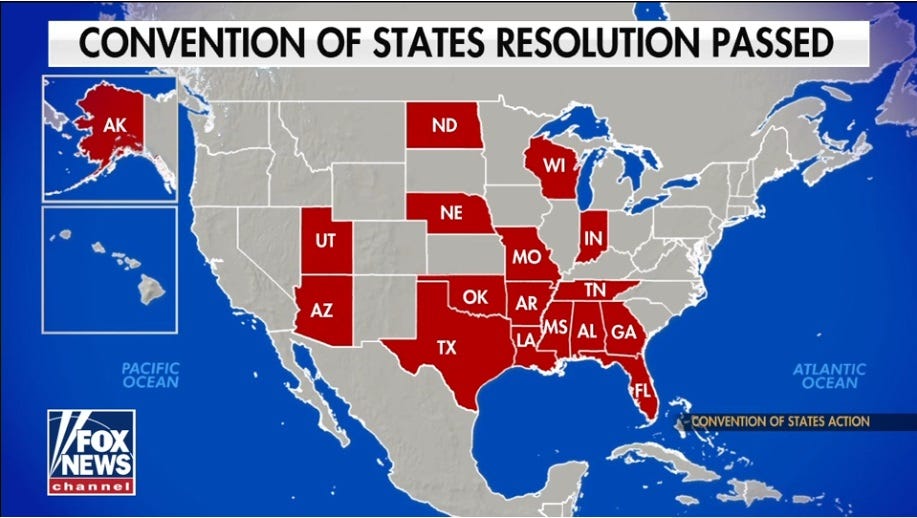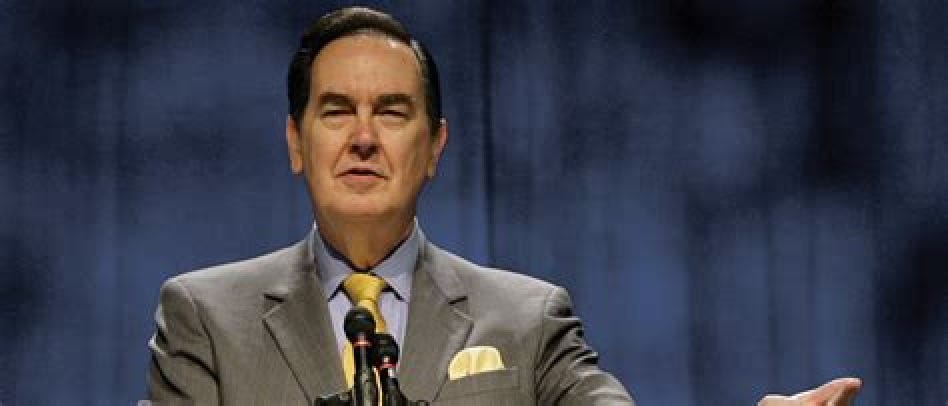Milestone reached in drive to call Article V Convention of States
The larger and more unwieldy the federal government becomes, the more imperative it is that new amendments be enacted to not only curb that growth, but to significantly prune it back.
Earlier this week, Nebraska became the 17th state to pass an Article V Convention of States resolution, pushing the effort to its halfway point. Last week, Wisconsin also passed its own resolution. (Photo Illustration": Fox News) _______________________________________________________________________________________________________________
Wisconsin and Nebraska have pushed the U.S. to the halfway point for holding an Article V Convention.
With those two states joining the effort, there are now 17 legislatures on record in support of enacting the constitutional provision that allows the people of the U.S. to bypass Congress and amend the framework document.
For such a gathering to convene, two-thirds of the states (34) must formally support a convention to be called, as the Convention of States Action (COS) website noted. And the addition of Nebraska puts the required number at the halfway point.
In Nebraska, the resolution’s author, state Sen. Steve Halloran, said that the out-of-control national debt spurred him to push for the measure. He also said that he feels states have lost too much power to Washington.
“Functionally, the founding fathers intended for the states to have equal footing with Congress,” the Republican said. “To me, that’s important. I think it’s a state sovereignty issue.”
“The states need to exercise their constitutional authority by proposing amendments through an Article V convention of states to restrain the federal government from driving our country into insolvency,” Halloran told Newsweek.
The resolution only passed after a sunset provision was added. Support for a convention of states in Nebraska will expire in February 2027 unless a convention is formally called before that time.
Wisconsin passed its own resolution on Jan. 25, three days before Nebraska’s.
There are only two ways to make changes to the U.S. Constitution, according to Article V of the law of the land. One way is for Congress to propose amendments for the states to consider. The second way is triggered when two-thirds of state legislatures come together to call a convention during which amendments can be proposed, whether Congress agrees or not.
“The fundamental question facing the country isn’t what we should do but who decides,” explained Mark Meckler, president of COS, according to Just the News. “Most decisions are made at the federal level outside the control of the American people. Our primary goal is to bring power back to states and the people.”
Meckler added that calling for a convention of states to address the problems in Washington is an effort that could go a long way to drain the swamp. “We have a structural problem in Washington, D.C., not a personnel problem,” Meckler said.
The Convention of States co-founder also addressed those who have complained that the process is taking too long since the effort was launched in 2013.
“It’s taking a long time because that’s how the founders intended the process to work,” he said. “They didn’t want us to be able to change the Constitution easily, because people would change it to go with the fads of their time. The founders wanted changes to be thoughtful and about building consensus over many years. That was the founders’ vision.”
Nebraska and Wisconsin have now joined Mississippi, Georgia, Alaska, Florida, Alabama, Tennessee, Indiana, Oklahoma, Louisiana, Arizona, North Dakota, Texas, Missouri, Arkansas and Utah in passing resolutions supporting a convention of states.
Government waste and runaway spending is one of the main reasons states required to call a constitutional convention now numbers 17, half the required total. (Photo Illustration: Duane Ricketts/America’s Conservative Voice) _______________________________________________________________________________________________________________
Eight states have passed the resolution in one chamber, but not the other. Those are New Mexico, Iowa, South Dakota, Virginia, North Carolina, South Carolina, West Virginia and New Hampshire. Under the Article V guidelines, there is no need for those state legislatures to give approval to the convention in the same legislative session.
Twenty other states ― Hawaii, Illinois, Iowa, Kansas, Kentucky, Massachusetts, Michigan, Minnesota, New Hampshire, New Jersey, New York, North Carolina, Ohio, Pennsylvania, South Carolina, South Dakota, Vermont, Virginia, Washington and West Virginia ― are set to consider their own Article V resolutions during this calendar year. It is conceivable an Article V convention could be called within the next two years.
Some have expressed worries that if such a constitutional convention were to be convened, the effort would run wildly out of control and the amendments adopted would make massive and sudden changes, altering the U.S. as we know it. Meckler dismisses that criticism by noting that the changes would still have to be ratified by three-fourths (38) of the states.
“The convention itself has zero authority beyond making suggestions,” Meckler explained. “The only measures that could win the support of 38 state legislatures are ones that have wide support, such as term limits and a balanced budget amendment. Things that are controversial and partisan won’t have the support.
Even if the required number of states call for such a convention, it won’t be an easy road to its convening. As The Western Journal’s Abby Liebing noted last year, “Once a call for convention was actually approved by enough states, Congress would then probably get to set the rules, since Article V does not lay out a specific outline for how the convention is to be run.” The rules would be controversial all on their own because “there is no real precedent for how a convention should be run. In 1787, the first and only Constitutional Convention, there was not even adherence to the rules.”
“Congress can purport to make whatever rules it wants for the convention. The convention can then throw them in the trash, which is certainly what the convention in Philadelphia did in 1787,” David Super, a constitutional law expert at Georgetown Law, told The Hill in December. “There’s no guarantee that they will follow the ratification procedures. The only precedent we do have [is that] they didn’t follow the ratification procedures.”
Leaders in the Convention of States effort have proposed rules identical to those adopted by the Constitutional Convention of 1787. There was no limitation on the number of delegates a state could send to the convention, but each state nonetheless got only one vote. That prevented the large, more populous states from dictating to the more rural Southern and Western states.
In addition, Meckler has suggested the convention open with a finite set of amendments to the Constitution to consider. In that way, everyone at the convention would know the issues beforehand, and there would be no provision for any state or group of states to propose additional amendments.
State legislatures are warming to the idea, in the wake of the abuses of authority the left has perpetrated using the COVID-19 crisis as an excuse.
Though initially reluctant to endorse an Article V Convention, conservative columnist Cal Thomas recently wrote an op/ed supporting the need for such a gathering. (Photo: Speaking.com) _______________________________________________________________________________________________________________
In an Op-Ed published by columnist Cal Thomas noted that he has been “on the side of the cautious” in the call for a constitutional convention, then added, “but as I see President Biden issuing record numbers of executive orders, bypassing the authority of Congress, and Congress on a spending binge that is driving the debt to record and unsustainable levels, perhaps threatening our very survival, I have come to the conclusion that nothing but a carefully organized and controlled constitutional convention can return power to where the Founders intended it to reside — with the people.”
The reason government has become so dysfunctional and unwieldy is that it has for too long exceeded the boundaries originally set for it. The Founders wanted government to be limited, so the people would be mostly unlimited in their pursuit of happiness, accompanied by individual responsibility and accountability.
Today’s federal government has achieved the opposite. It has grown ever larger and limited a number of freedoms we once took for granted. It has come to the point that even our vary basic rights of freedom of speech, of religion and assembly are threatened by the Fascist cabal currently ruling from Washington, D.C. This has caused serious consequences, including too many people believing that government is their primary source for all things.
For its part, the Fascist Left that has seized power in the last 13 months, making an Article V Convention more necessary that ever, is vehemently opposed to holding such a gathering of the States. They are fear-mongering over the possibility.
Common Cause, a Fascist Left organization that claims to be a charity, a champion of American democracy ― but is not organized as a 501(c)(3) IRS registered nonprofit ― is among the leading propagandists lying about what an Article V Convention can do or could accomplish.
In a post on the Common Cause website in March 2018, the organization warned of a “well-funded, highly coordinated national effort is underway to call a constitutional convention, under Article V of the U.S. Constitution, for the first time in history. The result of such a convention could be a complete overhaul of the Constitution and supporters of the convention are dangerously close to succeeding.”
The article went on to claim that “special interest groups [are] gaining more momentum, conservative advocates are just six states short of reaching the constitutionally-required 34-state goal. They are targeting Republican-controlled legislatures in 2021 and are within striking distance.”
As noted, with Wisconsin and Nebraska having just joined the ranks of states endorsing an Article V Convention, only half of the states have passed resolutions. Five of those have passed legislation to call a constitutional convention since that pack of lies was published, Obviously, Common Cause will do anything and say anything to try to prevent a convention from convening.
The larger and more unwieldy the federal government becomes, the more imperative it is that new amendments be enacted to not only curb that growth, but to significantly prune it back. The only way we are going to control spending is to force Congress and the president to approve a balanced budget, provide the Oval Office occupant with a line-item veto and to force Congress to live with term limits.
As government — especially at the federal level — continues to take more power unto itself, perhaps this convention of states will find the wind at its back and the people will rise up and once again call for serious limits to be placed on the power of government, so we can return to the roadmap the founders provided.
Mike Nichols is an advocate of the counterrevolution with a four-step plan to defeat Leftist Fascism: We Organize. We Stand. We Resist. We Fight. He is a regular contributor to several conservative news websites and has a regular blog and Facebook presence at Americas Conservative Voice-Facebook.







